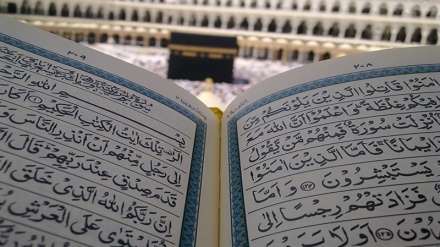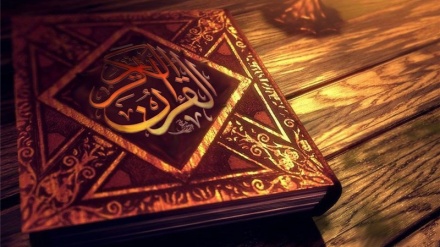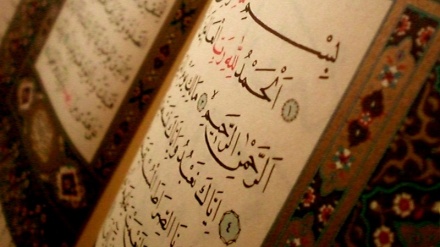Path towards Enlightenment (1043)
Welcome to our latest episode of “Path towards Enlightenment”, which is an endeavour to make you and us familiar with an easy and fluent explanation of God’s Final Scripture to all mankind, the holy Qur’an that was revealed to the Last and Greatest of all Messengers, Prophet Mohammad (blessings of God upon him and his progeny).
We are currently in the process of explanation of “Surah Jinn” – number 72 in the serial order of compilation of the holy Qur’an. It was revealed in Mecca and has 28 Ayahs. The title of the Surah indicates that it mainly treats a species of creatures invisible to the human eye, and hence called “jinn”. Endowed with some sort of intelligence and the moral choice to discern good from evil, the jinn have believers and disbelievers amongst them. They were acquainted with the prophets of the past and the previously revealed heavenly scriptures. With the start of the universal mission of Islam it became incumbent upon them, similar to the human race, to believe in the message entrusted by God Almighty to the “Mercy unto the whole creation”, that is, Prophet Mohammad (blessings of God upon him and his progeny). They shall be rewarded or punished according to their specific deeds. The Surah ends with Ayahs referring to the Almighty Creator’s knowledge of the unseen that is unknown to all beings.
We start from where we left you last week and here are Ayahs 16 and 17:
“And if they (the people) are steadfast on the path [of Allah], We shall provide them with abundant water,
“So that We may test them therein; and whoever turns away from the remembrance of his Lord, He will let him into an escalating punishment."
If you might recall, in our explanation of the previous Ayahs of this Surah last Friday, we said the Almighty Creator has granted free will, to both mankind and jinn, to differentiate between good and evil; hence some have embraced the truth of Islam, while others have splintered into several sects. We also said that the entire universe is the creation of Allah, and so none can escape what the All-Wise Creator has decreed, since the eventual fate of every one depends on his/her deeds, with eternal bliss for the righteous and everlasting punishment for the disbelievers, oppressors, and the wicked.
The Ayahs that we recited to you now mean to say that the reward for those who believe and are steadfast on the right path is abundant blessings. Water is one of greatest signs of Divine Mercy since it is the elixir of life and where ever there is abundant water the various bounties of God Almighty are evident in the form of thriving agriculture, pastures for domesticated animals, hydro-electric power for industries, pleasant climate, and many other benefits. In explanation of Ayah 16, the Prophet’s 6th Infallible Heir, Imam Ja’far as-Sadeq (AS) has said water also stands for knowledge and for those who firmly adhere to the Wilayah or Divine-decreed authority of the Ahl al-Bayt are granted knowledge in abundance.
Abundance of bounties are a form of Divine test to determine the degree of faith or the lack of it, as is clear by Ayah 17 which is a warning against vanity, ingratitude, negligence in the performance of obligations, and disobedience of God Almighty, which could lead to severe punishment.
These Ayahs teach us that:
- Steadfastness on the Right Path leads to abundance of bounties both in the transient life of the mortal world and in the eternity of Afterlife.
- Ingratitude, negligence of duties, and disobedience of Divine commandments results in misery in life and punishment in the Hereafter.
- God Almighty tests mankind, both believers and disbelievers, with either abundance or lack of bounties.
Now let us listen to Ayahs 18 and 19 of the same Surah:
“And the places of worship belong to Allah, so do not invoke anyone along with Allah.
“And when the servant of Allah (the Prophet of Islam) rose to pray to Him (the Almighty Creator), they almost crowded around him."
These Ayahs reaffirm monotheism in its perfect sense, and are a stern warning against polytheism or associating others, whether idols or imaginary figures, with the One and Only Creator Who has no need of any helper or assistant.
According to Imam Ja’far as-Sadeq (AS) Muslims are warned against disrespecting places of worship, as the Jews and the Christians had done in synagogues and churches by ascribing partners to the Almighty Creator.
If the former call themselves ‘children of god’, the latter worship the trinity, while the pagan Arabs had turned into an idol-house Abraham’s edifice of monotheism, that is, the Holy Ka’ba.
Intercession by the command of God is not forbidden, since the Prophets and Imams are Divinely-appointed and are thus revered as means to attain Divine proximity, rather than being objects of worship.
Ayah 19 refers to the attempts of the pagan Arabs in Mecca to crowd around the Prophet and make noises when he used to stand for prayers, in order to prevent the people from listening to his recitation of Ayahs of the Holy Qur’an and phrases of God’s monotheistic majesty.
These Ayahs teach us the following points:
- Places of worship in Islam or more properly mosques where the believers prostrate to Almighty God, should not be polluted and turned into centres of polytheism by invoking other than the One and Only Creator, or by setting up idols and pictures there.
- Intercession with Allah's chosen servants, such as the Prophets and the Imams, is not a form of polytheism as some ignorant persons allege, since these emissaries of God are revered rather than being worshipped.
- The most humble part of the ritual prayer is “sadjah” or prostration to God the Omnipresent, and hence the place of worship in Islam is called “Masjid”.
- The Prophet of Islam is the most dedicated ‘Servant of Allah’ and it was the habit of the pagan Arabs of Mecca to crowd around him and make noises when he stood for performing the ritual prayer, so that the people should not listen to his dynamic description of monotheism and words of wisdom.
In conclusion of this week’s episode of Path toward Enlightenment, here are Ayahs 20, 21 and 22 of Surah Jinn:
“Say (O’ Prophet to the polytheists), 'I pray only to my Lord, and I do not ascribe any partner to Him.'
“Say, 'Indeed, I have no power to bring you any harm or good [of my own accord].'
“Say, ‘Indeed, no one can protect me from Allah, nor can I find any refuge other than Him.”
In these Ayahs, Prophet Mohammad (blessings of God upon him and his progeny) is commanded to affirm the pillars of monotheism by performing the ritual prayer in the correct way, and telling the pagan Arabs that only the Unseen but Omnipresent God is being worshipped and no one else are being invoked.
The Prophet is further commanded to say that as a human being he has no power by himself to bring any benefit or cause any harm, other than what God has bestowed upon him and entrusted to him the universal mission of Islam for guidance of mankind and jinn.
Ayah 22 means to say that no one can protect anybody from Divine Wrath, which is the result of sins and disobedience of God, Who Alone is the Supreme Shelter and Refuge.
From these Ayahs we learn that:
- The Prophets and the Imams have been granted infallibility by God in view of their sincere-most servitude to Him and thus do not invoke anyone else or anything except the Almighty Creator.
- Whatever power the Prophet possesses is bestowed by God.
- All are equal before Divine Law and no one, not even the Prophets, are immune from God, Who is the ultimate shelter and refuge.
RM/AS/SS


